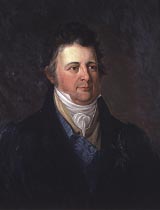Herman Wedel Jarlsberg
| Count Wedel Jarlsberg | |
|---|---|
 |
|
| Governor-general of Norway | |
|
In office 1836–1840 |
|
| Monarch | Karl III Johan |
| Preceded by | Baltzar von Platen |
| Succeeded by | Severin Løvenskiold |
| Personal details | |
| Born | 21 September 1779 Montpellier France |
| Died | 27 August 1840 Wiesbaden, Germany |
| Nationality | Norwegian |
| Spouse(s) | Karen Anker |
Johan Caspar Herman Wedel Jarlsberg (21 September 1779 – 27 August 1840) was a Norwegian statesman and count. He played an active role in the constitutional assembly at Eidsvoll in 1814 and was the first native Norwegian to hold the post of governor (representing the absent king as head of the Norwegian cabinet) during the union with Sweden.
Wedel Jarlsberg was born in Montpellier, France, son of Diplomat Frederik Anton Wedel-Jarlsberg (1748–1811) and Catharina Storm (1756–1802). He studied law in Copenhagen and graduated in 1801. He accepted a commission as the king's official for the district of Buskerud in 1806.
During the Napoleonic Wars, his connections with Sweden increased, and when the appointed and adopted Swedish crown prince, Carl August died in 1810, his name was mentioned as a possible substitute in a desperate situation. Jean Baptiste Bernadotte was appointed and adopted and changed his name to Carl Johan.
Wedel-Jarlsbergs engagement for a Norwegian union with Sweden did not diminish. He maintained strongly that Norwegian interests were often contrary to the Danish, and that after the Swedes had adopted a constitution in 1809, Norwegian interests would be more strongly secured in a union with that country. He was of course well aware of the Swedish campaign to incorporate Norway as a substitution for the lost Finnish provinces. In some popular works count Wedel-Jarlsberg has been described as a traitor – a fifth-columnist – which is completely unjust. His opinions were well known to the educated public, and even if he was politically isolated to some extent, his title and position in the Norwegian society never changed much.
During Norway's efforts to secure independence from Denmark and Sweden in 1814, he hence advocated a moderate approach to the issue. He was the obvious leader of the party which has been named "the Swedish Party" or "the Negotiation Party". He maintained that Norway would not manage to stand completely alone, alienated from all the leading powers in Europe, which had unanimously guaranteed Norway as a Swedish province. But there is no evidence that his point of view in any sense prevented him from fighting for a Norwegian constitution inspired by those of the United States and France, which the Swedish constitution was not. He belonged to the minority in the main topic on the Constitutional Assembly at Eidsvoll, but he was vindicated by subsequent events.
...
Wikipedia
